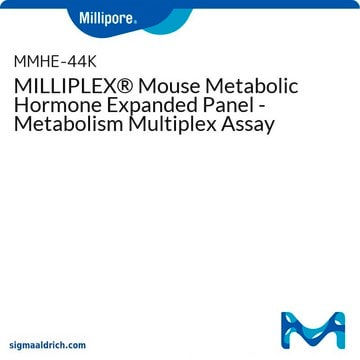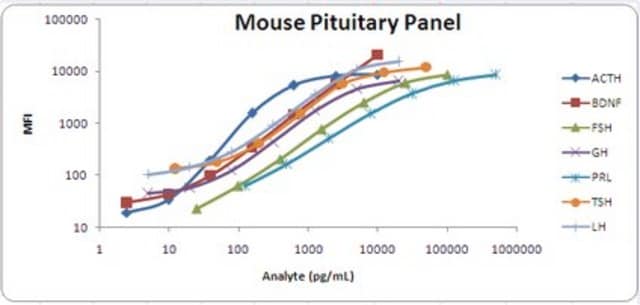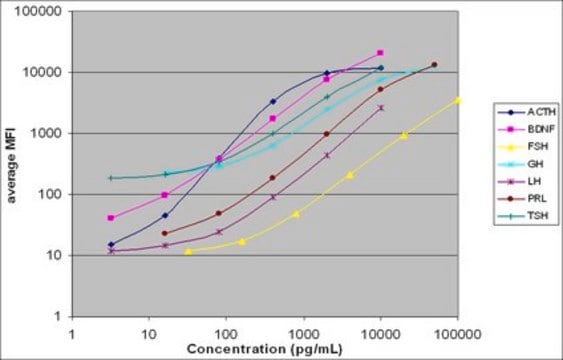RMNPMAG-83K
MILLIPLEX® Rat/Mouse Neuropeptide Magnetic Bead Panel - Neuroscience Multiplex Assay
The analytes available for this multiplex kit are: α-MSH, β-Endorphin, Neurotensin, Oxytocin, Substance P.
About This Item
Recommended Products
Quality Level
species reactivity
mouse, rat
manufacturer/tradename
Milliplex®
assay range
accuracy: 107-135%
(Rat)
standard curve range: 14-100,000 pg/mL
(Oxytocin)
standard curve range: 27-20,000 pg/mL
(Neurotensin)
standard curve range: 3-2,000 pg/mL
(Substance P)
standard curve range: 41-30,000 pg/mL
(α-MSH)
standard curve range: 69-50,000 pg/mL
(β-Endorphine)
technique(s)
multiplexing: suitable
detection method
fluorometric (Luminex xMAP)
shipped in
wet ice
General description
An important note about this panel is that the samples may be extracted using either the acetonitrile precipitation technique or the Waters 96-well HLB extraction plate. Please refer to the protocol for more information on both methods. The necessary components to perform the extractions are not included with the kit.
The central nervous system is a complex environment consisting of billions of neurons as well as glial support cells. These neurons use many different chemical signals to communicate information, including neurotransmitters, cannabinoids, peptides, and gases such as nitric oxide. Neuropeptides are secreted primarily from the central and peripheral nervous systems, exerting a broad spectrum of biological functions that includes the regulation of metabolism, reproduction, and immunity.
Panel Type: Neuroscience
Application
- Analytes: α-MSH, β-Endorphin, Neurotensin, Oxytocin, Substance P.
- Recommended Sample type: serum, plasma, CSF, and tissue culture
- Recommended Sample dilution: This assay requires 50 μL extracted serum or plasma sample per well or 50 μL neat CSF or culture media per well
- Assay Run Time: Overnight
- NOTE: this is a competitive assay.
Features and Benefits
Other Notes
Legal Information
Signal Word
Danger
Hazard Statements
Precautionary Statements
Hazard Classifications
Acute Tox. 3 Dermal - Acute Tox. 4 Inhalation - Acute Tox. 4 Oral - Aquatic Chronic 2 - Skin Sens. 1
Storage Class Code
6.1C - Combustible acute toxic Cat.3 / toxic compounds or compounds which causing chronic effects
Certificates of Analysis (COA)
Search for Certificates of Analysis (COA) by entering the products Lot/Batch Number. Lot and Batch Numbers can be found on a product’s label following the words ‘Lot’ or ‘Batch’.
Already Own This Product?
Find documentation for the products that you have recently purchased in the Document Library.
Our team of scientists has experience in all areas of research including Life Science, Material Science, Chemical Synthesis, Chromatography, Analytical and many others.
Contact Technical Service









